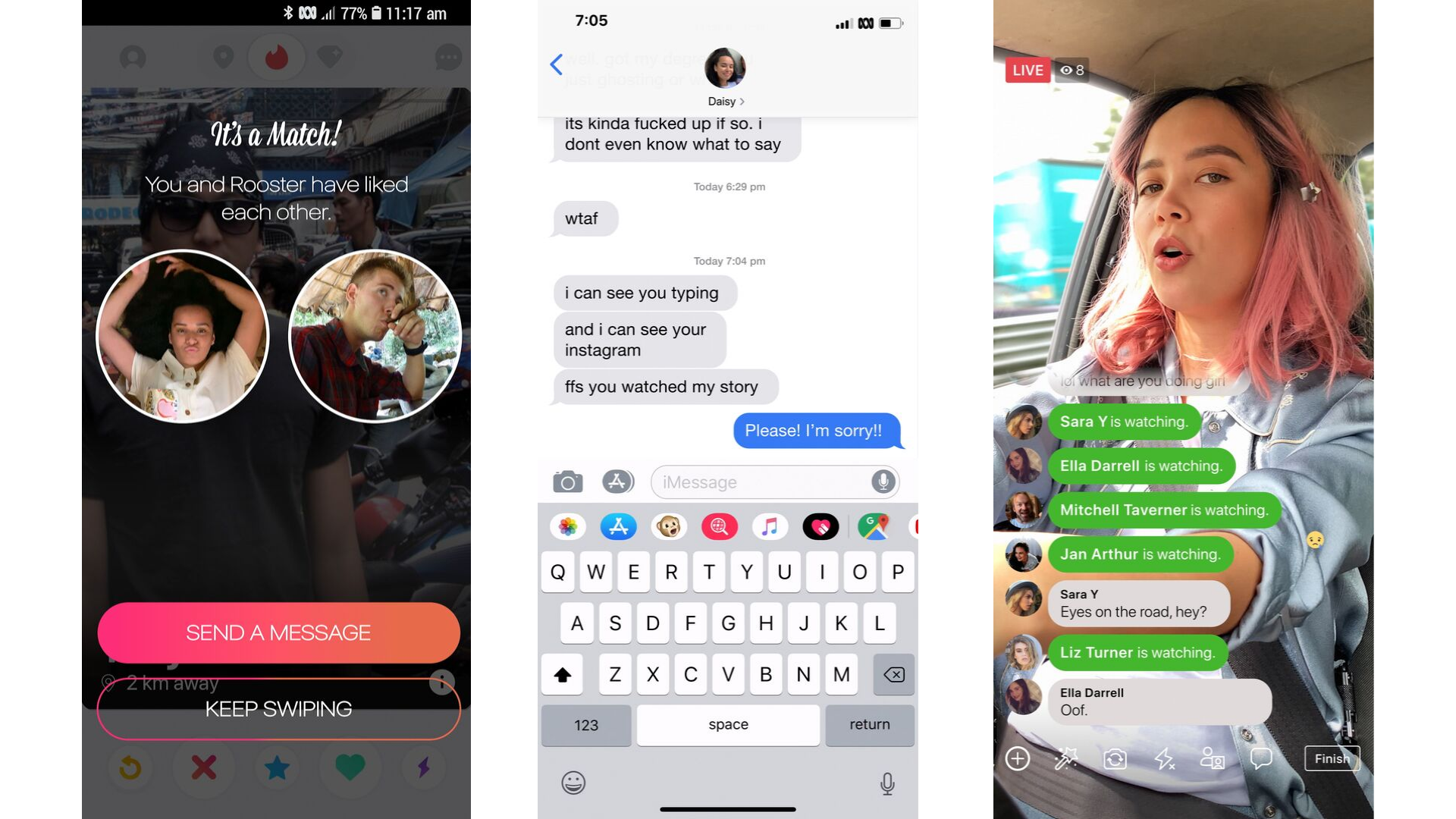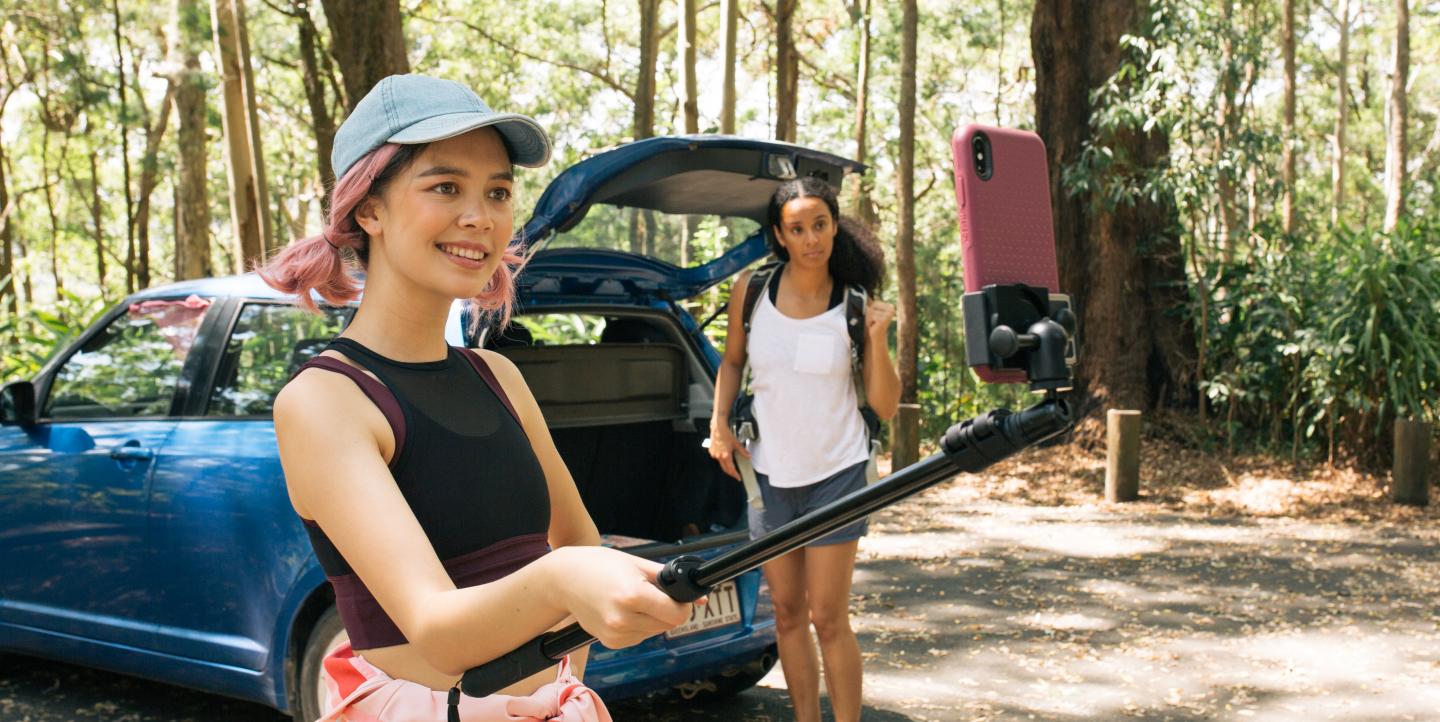Australia’s national broadcaster is midway through a storytelling experiment that’s so new, they had to invent a name for it.
The Australian Broadcasting Corporation (ABC)’s “Content” is a seven-part comedy-drama about an aspiring influencer named Lucy, who becomes an internet sensation after filming herself surviving a car crash.
“To us, it’s a vertical comedy show, but other people have been calling it a ‘portrait-mode screen life drama,’” explains ABC Executive Producer Que Minh Luu, who loved the idea of a story told from the perspective of a smartphone at a pitch meeting by its creators, the independent film company Ludo Studio.
Every element of the story is told from the phone’s first-person perspective, using screen-captured video and photos, social media posts, video calls and searches on Google and Tinder.
“It’s a bit like found footage, but told entirely from the phone’s perspective. We felt that there was a story to be made out of the way we use our phones, how integrated they are in our lives, and about the secrets they hold, that only they can tell,” Luu says.

It’s also designed to be viewed on a smartphone, and is being published on platforms used by young audiences – Instagram, YouTube, Facebook and Twitter.
“Content” represents one of a number of initiatives underway in Australia to deliver more mobile-first and social-first content in a country that — according to the Australian Bureau of Statistics — has more registered handsets than people, and where the percentage of audiences accessing social media on mobile continues to rise. In August, for example, seven major publishers reached a deal to create exclusive content for Facebook, including original news shows for Facebook Watch.
While it was obvious to the ABC and Ludo that a mobile-first vertical drama was a great idea, getting audiences and funders to understand and back the concept took nearly two years.
After months of audience focus groups, Ludo created a sample episode, which persuaded Screen Australia and Screen Queensland to join the ABC in funding it.
Making the show also took time, as Ludo’s filmmakers navigated the unfamiliar challenges of the new format, says Meg O’Connell, executive producer at Ludo.
“The series is a blend of live action and animation, and people might not realize that almost none of it is screen-captured,” she adds.
One of the animated clips is the scene of the car accident at the heart of the story. A clip of the crash received nearly five million views on Twitter, with viewers arguing whether it was real or not, prompting a fact-check by Agence France-Presse and a Tweet from Ludo animator lead Benjamin Zaugg showing how it was done.
Bucking the current trend to publish the entire series for binge-watching, “Content” is being uploaded bi-weekly over its seven-episode run from Sept. 3-28.
That was done partly to take advantage of the Facebook algorithm, which rewards repeat visitors to a brand, but also to give the audience time to digest both the new format and the story, and be free to talk about both without dishing spoilers.
The ABC’s head of social media strategy, Scott Gamble, says “Content” is part of a wider strategy at the public broadcaster to reach younger audiences with “fit-for-platform content for the third party platforms where they choose to spend their time.”
“Similar to VR [virtual reality], I think there is potential in the immersive experience of a series like ‘Content’ to tell news and factual entertainment stories,” he says. For example, Gamble points to a 2016 BBC Media Action video that captures elements of the European refugee crisis by imagining the viewer’s phone is actually a refugee’s phone. It’s a “good example of a similar approach in a news context — using the first-person perspective to enhance empathy by allowing the viewer to walk in another’s virtual shoes.”
Angela Stengel heads the Content Ideas Lab at the ABC, which oversaw the show’s production, and says the new show takes vertical into areas that haven’t previously been used by news, but could be in the future.
“News organizations have always been quick to jump in and try new tools and platforms such as vertical video,” says Stengel. “It’s not just about shooting in a different format – it’s an intimate and personal experience where you have a different relationship with the characters, really being drawn into their world.”
“I see ‘Content’ doing for vertical storytelling what ‘Serial’ did for podcasting,” she adds. “This approach to format can be applied to factual as well as fictional stories."
“Content” is made by Ludo, with funding from the ABC, Screen Australia and Screen Queensland. The series can be watched on YouTube here.
Main image shows Gemma Bird Matheson as Lucy and Charlotte Nicdao as Daisy behind the scenes creating ABC's "Content." Image credit: Mia Forrest

